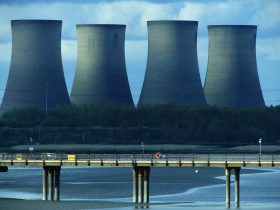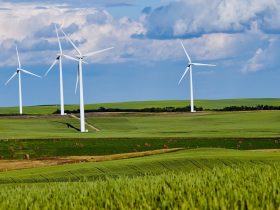As the world becomes more conscious of the environmental impact of human activities, ethical investments in clean air initiatives are gaining momentum. Investors are increasingly recognizing the importance of supporting technologies and solutions that promote clean air, reduce pollution, and improve public health. In this article, we will explore the emerging trends in ethical investments in clean air initiatives and discuss their potential impact on the future.
Rise of Impact Investing
Impact investing, which focuses on generating positive social and environmental outcomes alongside financial returns, is gaining popularity in the investment community. This trend is particularly evident in the clean air sector, where investors are actively seeking opportunities to support companies and projects that address air pollution and promote clean air solutions.
Impact investors are not only motivated by financial gains but also by the desire to make a positive difference in the world. They prioritize investments that have a measurable impact on air quality, public health, and environmental sustainability. This shift towards impact investing is expected to drive the growth of ethical investments in clean air initiatives in the coming years.
With the rise of impact investing, we see a shift in the mindset of investors. They are no longer solely focused on financial returns but also the social and environmental impact of their investments. This change in perspective is reshaping the investment landscape and driving the demand for ethical investments in clean air initiatives.
Technological Advancements
Technological advancements are playing a significant role in shaping the future of ethical investments in clean air initiatives. Innovations in renewable energy, air purification systems, and emission reduction technologies are creating new investment opportunities. These advancements not only improve the effectiveness of clean air solutions but also enhance their economic viability.
Investors are increasingly drawn to companies that develop and deploy cutting-edge technologies to combat air pollution. From solar and wind power to advanced air filtration systems, these technologies offer both financial returns and environmental benefits. As technology continues to evolve, the potential for ethical investments in clean air initiatives will expand, attracting more investors to the sector.
Moreover, technological advancements are driving down the costs of clean air solutions, making them more accessible and economically viable. This affordability factor is crucial in attracting a broader range of investors, including institutional investors and retail investors, to participate in ethical investments in clean air initiatives.
Policy Support and Regulatory Frameworks
Government policies and regulatory frameworks play a crucial role in shaping the landscape of ethical investments in clean air initiatives. As awareness of air pollution’s detrimental effects grows, governments around the world are implementing stricter regulations and incentives to encourage clean air solutions.
Investors are closely monitoring policy developments and aligning their investments with supportive regulatory environments. They recognize that investments in companies and projects that comply with environmental regulations and receive government support are more likely to succeed in the long run. The presence of clear policies and regulatory frameworks provides a stable and predictable investment environment, attracting capital to the clean air sector.
Furthermore, governments are increasingly recognizing the economic potential of clean air initiatives and are actively supporting them through grants, subsidies, and tax incentives. This government support not only provides financial benefits to investors but also reduces the risks associated with investing in clean air projects. As a result, ethical investments in clean air initiatives are becoming more attractive and secure for investors.
Collaboration and Partnerships
Collaboration and partnerships are becoming increasingly important in the field of ethical investments in clean air initiatives. Investors are realizing that addressing air pollution requires a collective effort involving various stakeholders, including governments, businesses, non-profit organizations, and local communities.
Investors are actively seeking opportunities to collaborate with like-minded organizations to maximize the impact of their investments. By pooling resources, expertise, and networks, they can support large-scale clean-air projects and drive systemic change. Collaboration and partnerships also facilitate knowledge sharing and innovation, leading to more effective and sustainable solutions.
In addition to collaboration among investors, partnerships between investors and companies are crucial for the success of ethical investments in clean air initiatives. These partnerships allow investors to actively participate in the decision-making process and ensure that their investments align with their values and objectives. By working together, investors and companies can create a win-win situation, where financial returns are achieved alongside positive environmental and social impacts.
Public Awareness and Consumer Demand
Public awareness and consumer demand for clean air solutions are driving the growth of ethical investments in this sector. As individuals become more informed about the health risks associated with air pollution, they are demanding cleaner and healthier environments. This demand is influencing consumer choices and shaping market trends.
Investors recognize the potential for financial success in meeting this growing consumer demand for clean air solutions. They are investing in companies that develop products and services that improve air quality, such as electric vehicles, renewable energy systems, and air purifiers. By aligning their investments with consumer preferences, investors can tap into a rapidly expanding market and contribute to a cleaner future.
Moreover, public awareness campaigns and advocacy efforts are playing a crucial role in driving the demand for ethical investments in clean air initiatives. Non-profit organizations, environmental activists, and media outlets are raising awareness about the importance of clean air and the need for sustainable solutions. This increased awareness not only influences consumer behavior but also puts pressure on governments and businesses to take action.
As public awareness continues to grow, governments are under increasing pressure to implement stricter regulations and policies to address air pollution. This creates a favorable environment for ethical investments in clean air initiatives, as investors can rely on a supportive public sentiment and a growing market for clean air solutions.
Conclusion
Ethical investments in clean air initiatives are poised to play a significant role in shaping the future of sustainable finance. The rise of impact investing, technological advancements, supportive policies and regulatory frameworks, collaboration and partnerships, and public awareness and consumer demand are key trends driving the growth of this sector. As investors increasingly prioritize social and environmental impact alongside financial returns, ethical investments in clean air initiatives will continue to thrive, contributing to a healthier and more sustainable world for future generations.
The future of ethical investments in clean air initiatives is promising, with a wide range of opportunities for investors to make a positive impact. As technology continues to advance and governments implement supportive policies, the clean air sector will continue to attract capital and drive innovation. By investing in clean air initiatives, investors not only have the potential for financial returns but also contribute to the improvement of air quality, public health, and environmental sustainability.
As the world becomes more aware of the importance of clean air, the demand for ethical investments in this sector will only continue to grow. Investors who recognize the potential of this emerging trend and align their investments with clean air initiatives will not only contribute to a cleaner and healthier future but also position themselves for long-term success in the evolving landscape of sustainable finance.


































